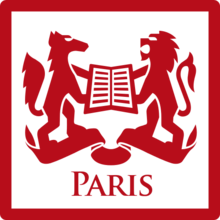
Back Institut d’études politiques de Paris Afrikaans Institut d’études politiques de Paris ALS معهد الدراسات السياسية بباريس Arabic ساينس پو ARZ Institutu d'Estudios Políticos de París AST Siyasi Araşdırmalar İnstitutu (Paris) Azerbaijani Institut d'études politiques de Paris BAR Институт за политически науки в Париж Bulgarian Institut d'études politiques de Paris Breton Sciences Po BS
Institut d'études politiques de Paris (French) | |
 | |
| Latin: Institutum Scientiarum Politicarum Parisiense | |
Other name | Sciences Po |
|---|---|
Former name | École libre des sciences politiques |
| Motto | French: Aux racines de l'avenir |
Motto in English | At the roots of the future |
| Type | Public research university Grande école[1] Grand établissement Institut d'études politiques |
| Established | 1872 |
| Founder | Émile Boutmy |
| Endowment | €127.2 million (2018)[2] |
| Budget | €197 million (2018)[2] |
| Chairperson | Laurence Bertrand Dorléac (FNSP)[3] |
| President | Luis Vassy |
| Provost | Sergei Guriev[4] |
Academic staff | 300[5] |
| Students | 15,000[6] |
| Undergraduates | 4,000 |
| Postgraduates | 10,000 |
| 350 | |
| Location | , France 48°51′15″N 2°19′43″E / 48.85417°N 2.32861°E |
| Campus | Urban |
| Language | French and English (official, university-wide) German (working language at the Nancy campus)[7] Spanish (working language at the Poitiers campus)[8] |
| Printing house | Sciences Po Press |
| Colours | Red White |
| Affiliations | CIVICA Sorbonne Paris Cité APSIA COUPERIN[9] CGE |
| Mascot | The lion and the fox |
| Website | sciencespo.fr |
Sciences Po (French: [sjɑ̃s po]) or Sciences Po Paris, also known as the Paris Institute of Political Studies (French: Institut d'études politiques de Paris, pronounced [ɛ̃stity detyd pɔlitik də paʁi]), is a private and public[10][11][12] research university located in Paris, France, that holds the status of grande école and the legal status of grand établissement. The university's undergraduate program is taught on the Paris campus as well as on the decentralized campuses in Dijon, Le Havre, Menton, Nancy, Poitiers and Reims, each with their own academic program focused on a geopolitical part of the world. While Sciences Po historically specialized in political science, it progressively expanded to other social sciences such as economics, law and sociology.
The school was established in 1872 by Émile Boutmy as the École libre des sciences politiques in the aftermath of the Franco-Prussian War as a private institution to form a new French elite that would be knowledgeable in political science, law and history.[13] It was a pioneer in the emergence and development of political science as an academic field in France.[13] Following World War II, the school was nationalized and re-established as a public institution.[14] As of 2021, 80% of Sciences Po graduates are employed in the private sector.[15]
Sciences Po Paris is the only Institute of Political Sciences in France allowed to refer to itself with the epithet "Sciences Po" without indicating the name of the city where their headquarters are located, under a legal agreement with the other institutes.[16] They are allowed to use the term "Sciences Po" to refer to themselves only when followed by the names of the cities where they are located, such as "Sciences Po Lille" or "Sciences Po Grenoble".[17]
The institute is a member of the Association of Professional Schools of International Affairs and The European University of Social Sciences.[18]
- ^ "Sciences Po rejoint la Conférence des grandes écoles". 30 June 2016. Archived from the original on 7 May 2019. Retrieved 16 December 2019.
- ^ a b "Governance & Budget". Sciences Po. Archived from the original on 17 August 2022. Retrieved 17 August 2022.
- ^ "Sciences Po : l'historienne Laurence Bertrand Dorléac qualifiée pour prendre la tête de la FNSP". Le Monde.fr (in French). 10 April 2021. Archived from the original on 19 April 2021. Retrieved 17 August 2022.
- ^ "CEPR Research Fellow Sergeï Guriev appointed Sciences Po Provost". CEPR. 26 July 2022. Archived from the original on 17 August 2022. Retrieved 17 August 2022.
- ^ "Overview: Facts & Figures". facts.
- ^ "Overview: Facts & Figures".
- ^ "Sciences Po Paris, Campus européen franco-allemand à Nancy - Forum Franco-Allemand". www.ffa-dff.org. Archived from the original on 17 August 2022. Retrieved 17 August 2022.
- ^ "Bienvenue à Poitiers Presente". POITIERS PRESENTE (in French). Archived from the original on 17 August 2022. Retrieved 17 August 2022.
- ^ "Les membres de Couperin", Couperin.org (in French), Paris, archived from the original on 17 November 2022, retrieved 12 July 2018
- ^ "L'IEP de Paris, favori de l'Etat". Le Monde.fr (in French). 25 January 2012. Retrieved 11 May 2024.
- ^ Nord, Philip (26 August 2012). France's New Deal: From the Thirties to the Postwar Era. Princeton University Press. ISBN 978-0-691-15611-8.
- ^ "Governance & Budget". Sciences Po. Retrieved 11 May 2024.
- ^ a b Noiriel, Gérard (1990). "Review of Naissances de la science politique en France (1870-1914)". Vingtième Siècle. Revue d'histoire (27): 130–131. doi:10.2307/3769067. ISSN 0294-1759. JSTOR 3769067.
- ^ Cite error: The named reference
ReferenceAwas invoked but never defined (see the help page). - ^ Adenor, Jean-Loup (3 December 2021). "Pantouflage : le conseil décomplexé du directeur de Sciences Po à ses étudiants". www.marianne.net (in French). Archived from the original on 15 January 2022. Retrieved 25 April 2022.
- ^ Chillaud, Matthieu (October 2014). "IR in France: state and costs of a disciplinary variety". Review of International Studies. 40 (4): 803–824. doi:10.1017/S0260210513000521. ISSN 0260-2105. S2CID 145486611. Archived from the original on 23 June 2023. Retrieved 23 June 2023.
- ^ figaro, le (2 February 2015). "L'utilisation du nom "Sciences Po" est désormais réglementée". Le Figaro Etudiant (in French). Archived from the original on 23 June 2023. Retrieved 20 July 2023.
- ^ Science, London School of Economics and Political. "CIVICA gets greenlight from the European Commission". London School of Economics and Political Science. Retrieved 17 August 2022.